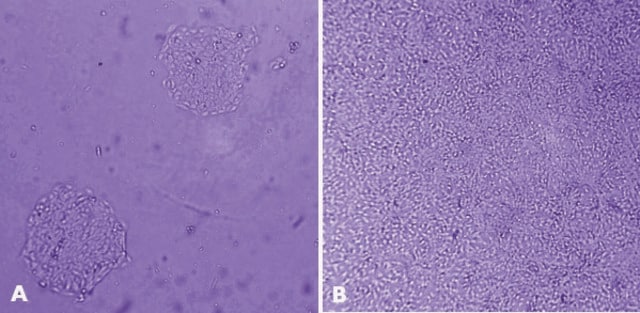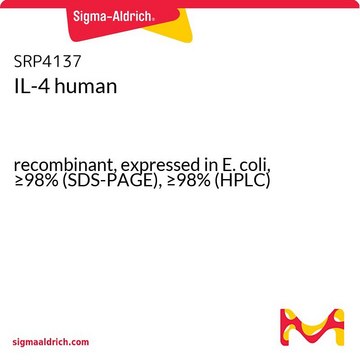SRP3287
IL-34 human
recombinant, expressed in HEK 293 cells, ≥95% (SDS-PAGE), ≥95% (HPLC)
Synonym(s):
C16orf77
Sign Into View Organizational & Contract Pricing
All Photos(1)
About This Item
UNSPSC Code:
12352202
NACRES:
NA.32
Recommended Products
biological source
human
recombinant
expressed in HEK 293 cells
Assay
≥95% (HPLC)
≥95% (SDS-PAGE)
form
lyophilized
mol wt
52.5 kDa
packaging
pkg of 10 μg
impurities
<0.1 EU/μg endotoxin, tested
UniProt accession no.
shipped in
wet ice
storage temp.
−20°C
Gene Information
human ... IL34(146433)
General description
IL-34 is a ligand for colony-stimulating factor-1 receptor (CSF1R), which also binds to CSF-1. It specifically binds CD14+ monocytes, promotes survival and proliferation of human peripheral blood monocytes, and stimulates macrophage colony formation by human bone marrow cells. IL-34, like human CSF-1 stimulates phosphorylation of MAPK1/ERK2 and MAPK3/ERK1.
Biochem/physiol Actions
IL-34 is a homodimeric cytokine that is expressed in a range of tissues including spleen, heart, brain, liver, kidney, lung, ovary, thymus, testis, small intestine, prostate and colon. Recombinant human IL-34 is a 52.5 kDa homodimeric glycoprotein consisting of 460 amino acid residues, including a C-terminal His-Tag.
Physical form
Lyophilized from 20 mM Sodium Citrate, pH 3.0 + 75 mM NaCl.
Reconstitution
Centrifuge the vial prior to opening. Reconstitute in water to a concentration of 0.1-1.0 mg/mL. Do not vortex. This solution can be stored at 2-8°C for up to 1 week. For extended storage, it is recommended to further dilute in a buffer containing a carrier protein (example 0.1% BSA) and store in working aliquots at -20°C to -80°C.
Signal Word
Warning
Hazard Statements
Precautionary Statements
Hazard Classifications
Eye Irrit. 2 - STOT SE 3
Target Organs
Respiratory system
Storage Class Code
10 - Combustible liquids
WGK
WGK 1
Flash Point(F)
Not applicable
Flash Point(C)
Not applicable
Choose from one of the most recent versions:
Already Own This Product?
Find documentation for the products that you have recently purchased in the Document Library.
Editorial: Leishmania survival mechanisms: the role of host phosphatases.
Marina Tiemi Shio et al.
Journal of leukocyte biology, 88(1), 1-3 (2010-07-02)
Xue Lin et al.
Critical care medicine, 46(6), e584-e590 (2018-02-01)
Sepsis is a devastating condition with a high mortality rate and limited treatments. Sepsis is characterized by a failed host immune response to contain the infection, resulting in organ dysfunction. Interleukin-34 is new cytokine involved in infection and immunity. Whether
Eleonora Franzè et al.
Journal of Crohn's & colitis, 10(1), 87-94 (2015-10-10)
Production of chemokines by intestinal epithelial cells is a key step in the amplification of the destructive immune-inflammatory response in patients with inflammatory bowel diseases [IBD]. In this study, we examined whether intestinal epithelial cells express macrophage colony-stimulating factor receptor
Eleonora Franzè et al.
Clinical science (London, England : 1979), 129(3), 271-280 (2015-03-25)
IBD (inflammatory bowel disease)-related tissue damage occurs in areas which are massively infiltrated with monocytes/macrophages. These cells respond to inflammatory stimuli with enhanced production of cytokines/chemokines. In the present study, we analysed the expression and role of IL (interleukin)-34, a
Eva Rietkötter et al.
Oncotarget, 6(17), 15482-15493 (2015-06-23)
The mononuclear phagocytic system is categorized in three major groups: monocyte-derived cells (MCs), dendritic cells and resident macrophages. During breast cancer progression the colony stimulating factor 1 (CSF-1) can reprogram MCs into tumor-promoting macrophages in the primary tumor. However, the
Our team of scientists has experience in all areas of research including Life Science, Material Science, Chemical Synthesis, Chromatography, Analytical and many others.
Contact Technical Service






